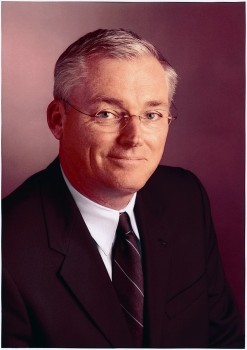Q&A: Joseph F. Keefe on the Principles of Sustainable Investing

Joseph F. Keefe
Details
Pax World Funds, launched in 1971, was the nation's first socially responsible mutual fund. But in recent years, under the leadership of Joseph F. Keefe, president and CEO of Pax World Management Corp., the company has shifted its focus to embrace what has become known as sustainable investing.
On October 2, Keefe was on campus, joining a panel discussion on sustainable investing. We caught up with him with a few questions about this emerging financial field.
Haverford College: What is sustainable investing?
Joseph F. Keefe: Sustainable investing is an emerging investment discipline that is particularly relevant and responsive to the global concerns we're seeing play out today. It brings environmental, social and governance factors—usually called ESG—into investment analysis. Those of use who practice sustainable investing try to integrate rigorous financial analysis with equally rigorous ESG analysis.
HC: How does that work in practice?
JK: There are a lot of metrics out there you can look at. For example, if you are looking at a company's environmental record, you can check the toxic release inventory put out by the Environmental Protection Agency, or research if they have had any EPA fines. You can look at what they do in terms of carbon emissions and recycling. What kind of programs do they have in place to reduce their environmental impact?
With governance, you can look at diversity on a company's board and in upper management. You can look at executive compensation and how good employee relations are. Are wages and benefits strong? Is turnover low?
With social factors, you want to know that they pay attention to their supply chain and avoid things like child labor or sweat shop labor.
HC: How does sustainable investing differ from socially responsible investing?
JK: Socially Responsible Investing (SRI) has been about investing according to your personal and social values. It has tended to be defined by what it doesn't invest in, by the companies and industries it screens out. It's not that we don't do some screening as well. At our company we don't invest in weapons manufacturers, tobacco companies or companies whose main line of business is gambling. But, more significantly, sustainable investing defines itself in terms of what it does invest in: companies that have a high ESG rating and strong financial performance.
HC: But some of us are as much concerned about a reliable return on our mutual fund investments as we are in corporations playing nice. Do good ESG ratings always correlate to good financial performance?
JK: There are so many studies out there that have established that ESG factors have financial materiality, that it is simply a mistake to ignore them.
We believe that in the coming years, long term financial health is really only possible to the degree that businesses and the markets internalize certain ESG imperatives. We believe that companies that don't externalize their costs onto society, that act in the public interest to preserve the planet, that are better governed, are going to be better investments in the long term.
HC: Could more of an emphasis on sustainable investing have saved us from the current financial crisis?
JK: The financial crisis is partly a result of real short-term thinking and a desire to create personal wealth and short-term profit taking rather than building a long-term durable business. I don't want to claim that [recently bankrupted insurer] AIG would not have passed our screening. But we've seen that companies that have strong governance are less likely to blow up.
HC: Do you think sustainable investing will catch on?
JK: I think that as an investment strategy it is really going to have wide appeal. That you can invest in a company that is doing good for the community, their workers, and the environment—and make good returns—is really an appealing thing.
For more information on "Going Beyond Socially Responsible: A Panel Discussion on Sustainable Investing," visit www.haverford.edu/calendar/details/71442.



